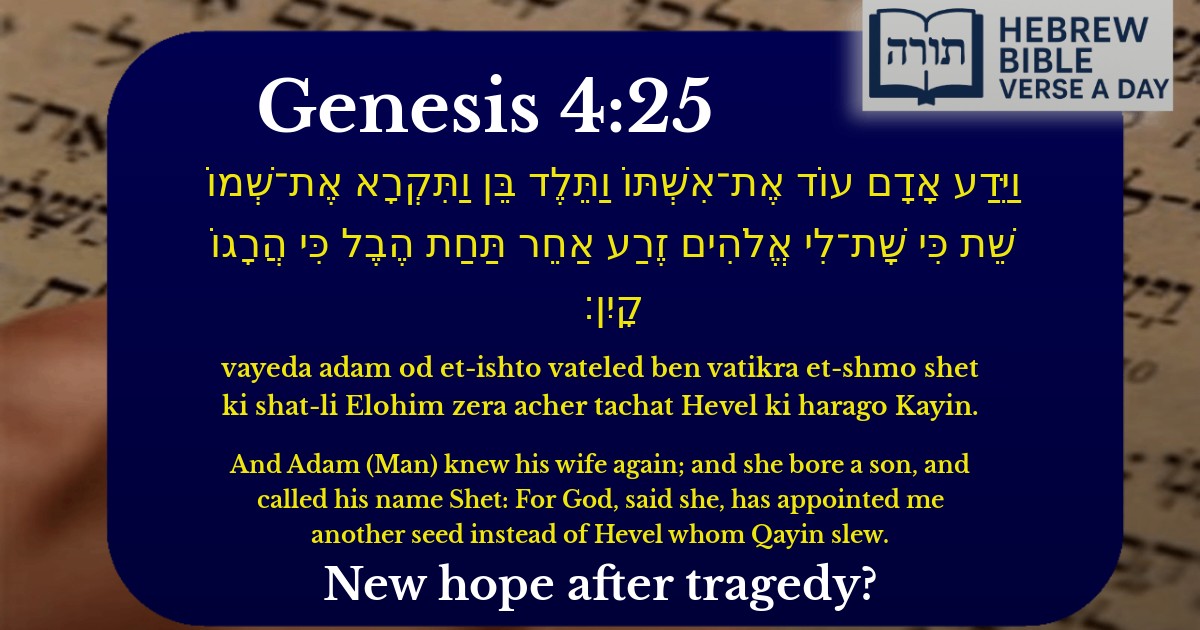Join Our Newsletter To Be Informed When New Videos Are Posted
Join the thousands of fellow Studends who rely on our videos to learn how to read the bible in Hebrew for free!
Hebrew Text
וַיֵּדַע אָדָם עוֹד אֶת־אִשְׁתּוֹ וַתֵּלֶד בֵּן וַתִּקְרָא אֶת־שְׁמוֹ שֵׁת כִּי שָׁת־לִי אֱלֹהִים זֶרַע אַחֵר תַּחַת הֶבֶל כִּי הֲרָגוֹ קָיִן׃
English Translation
And Adam (Man) knew his wife again; and she bore a son, and called his name Shet: For God, said she, has appointed me another seed instead of Hevel whom Qayin slew.
Transliteration
Vayeda adam od et-ishto vateled ben vatikra et-shmo shet ki shat-li Elohim zera acher tachat Hevel ki harago Kayin.
Hebrew Leining Text
וַיֵּ֨דַע אָדָ֥ם עוֹד֙ אֶת־אִשְׁתּ֔וֹ וַתֵּ֣לֶד בֵּ֔ן וַתִּקְרָ֥א אֶת־שְׁמ֖וֹ שֵׁ֑ת כִּ֣י שָֽׁת־לִ֤י אֱלֹהִים֙ זֶ֣רַע אַחֵ֔ר תַּ֣חַת הֶ֔בֶל כִּ֥י הֲרָג֖וֹ קָֽיִן׃
וַיֵּ֨דַע אָדָ֥ם עוֹד֙ אֶת־אִשְׁתּ֔וֹ וַתֵּ֣לֶד בֵּ֔ן וַתִּקְרָ֥א אֶת־שְׁמ֖וֹ שֵׁ֑ת כִּ֣י שָֽׁת־לִ֤י אֱלֹהִים֙ זֶ֣רַע אַחֵ֔ר תַּ֣חַת הֶ֔בֶל כִּ֥י הֲרָג֖וֹ קָֽיִן׃
🎵 Listen to leining
Parasha Commentary
📚 Talmud Citations
This verse is quoted in the Talmud.
📖 Berakhot 40a
The verse is referenced in a discussion about the naming of Seth (Shet) and the significance of his name as a replacement for Abel (Hevel).
📖 Eruvin 18b
The verse is cited in a broader discussion about the generations of Adam and the lineage of humanity.


The Birth of Shet
The verse (Bereshit 4:25) describes Chava (Eve) giving birth to Shet after the tragic death of Hevel (Abel) at the hands of Kayin (Cain). The name "Shet" (שֵׁת) is derived from Chava's declaration, "שָׁת־לִי אֱלֹהִים זֶרַע אַחֵר" ("God has appointed me another seed"), indicating divine providence in replacing Hevel.
Chava's Perspective
Rashi explains that Chava recognized this birth as a divine gift, using the term "שָׁת" (appointed) to express that Hashem had granted her a replacement for Hevel. The Midrash (Bereshit Rabbah 23:5) elaborates that Shet was destined to be the progenitor of all future humanity, as the line of Kayin was ultimately destroyed in the Flood.
The Significance of Shet
Theological Implications
The Kli Yakar highlights that Chava's statement reflects emunah (faith) in divine justice—acknowledging that even after tragedy, Hashem provides renewal. This mirrors the Jewish concept of "המקום ינחם אתכם" (Hashem consoles the bereaved) by granting new blessings.
Etymology of "Shet"
Ibn Ezra connects the name to the Hebrew root "שׁית" (to place or establish), symbolizing that Shet would establish a new, enduring line of humanity. This contrasts with Kayin's name (from "קניתי"—"I have acquired"), which reflected Chava's initial human-centered perspective.